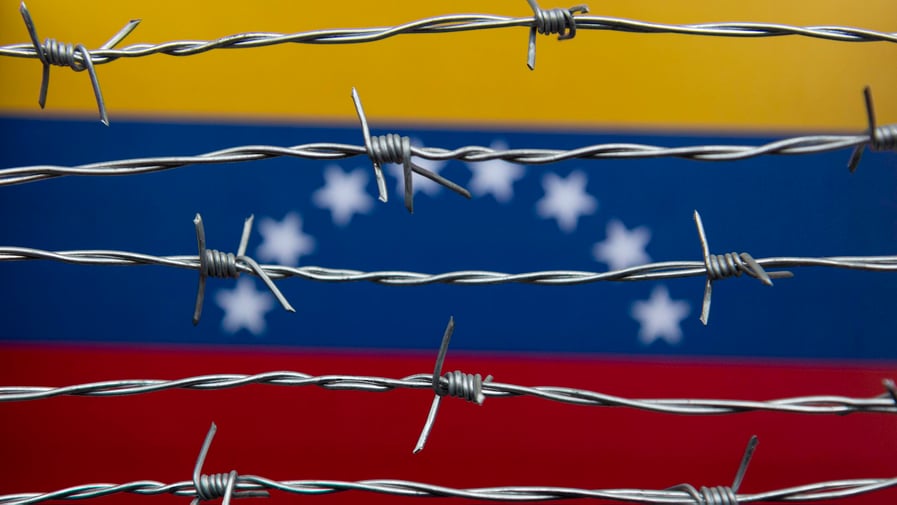Ahead of elections in July 2024, Venezuela has recorded the continued use of politically motivated arrests and detentions targeting those challenging Nicolás Maduro’s leadership. Shannon Lorimer explores wrongful detention trends over the course of Maduro’s presidency and considers its ongoing use as a tool to silence government critics after the vote.
Since 2018, the government has increasingly clamped down on freedom of speech in Venezuela, employing methods including wrongful detention, personnel harassment and press censorship to intimidate and silence criticism and opposition groups. As the country approaches a general election in July 2024, incumbent President Nicolás Maduro is likely to detain further individuals perceived to threaten his hold on power, including journalists, human rights activists, opposition politicians and any civil society organisations not aligned with his administration.
Maduro’s tendency towards arbitrary detention
Maduro has long used arbitrary arrests and wrongful detention as a tool to silence dissenters. According to the UN’s Fact-finding Mission on Venezuela, the current use of repression, including arbitrary detentions, corresponds with a similar pattern seen in the lead up to parliamentary elections in 2020, where Maduro’s administration increased its crackdown on journalists and those perceived to be critical of the government. There are no official tallies of political prisoners in Venezuela as the government denies any instances of wrongful detention, however, since 2019 non-governmental organisations have tracked between 250 and 350 political prisoners held in detention annually and have recorded around 16,000 politically motivated arrests since Maduro came to power in 2013. Local citizens make up the majority of wrongfully detained individuals in Venezuela, though more than a dozen US nationals have also been wrongfully detained since 2020. It is unclear how many of the political prisoners currently behind bars are foreign nationals, but in December 2023, Maduro’s government released ten wrongfully detained Americans and agreed to release other foreign nationals held in Venezuela as part of its sanctions-relief deal with the US government.
Non-governmental organisations …have recorded around 16,000 politically motivated arrests since Maduro came to power in 2013.”
Human rights reports and individual accounts indicate that instances of wrongful detention under Maduro’s regime have typically involved arrests without warrants, short periods of enforced disappearance followed by arrest, unspecific accusations with a low standard of evidence, and limitations on the victim’s access to legal counsel. The Venezuelan legal system also allows authorities to hold detainees for up to 12 months before trial, which, coupled with a partisan judiciary, has allowed Maduro and his allies to arrest opposition figures and critics of the regime on false charges, and in some cases secure a conviction through fabricated evidence.
Wrongful detention in 2023 and 2024
October 2023 brought about a glimmer of hope for democracy and freedom of speech in Venezuela. As part the agreement with the United States to begin lifting sanctions on Venezuela, Maduro’s government agreed to hold free and fair elections in 2024, and to set aside its tools of repression. However, Maduro’s regime quickly reneged on this agreement following growing voter support for opposition candidates, alongside emboldened activity from journalists and activists. To regain a hold of his leadership prospects, in January 2024, the Maduro regime initiated a crackdown on its dissenters, re-employing wrongful detention, and other acts of reprisal, to silence opponents. And, since the start of 2024, US warnings of reimposing sanctions have done little to reassure the international community that Maduro remains committed to the release agreement, or to loosen the reins on his current course of arbitrary detentions ahead of elections. In the first three months of 2024, Maduro’s administration arrested at least 30 people, targeting journalists, lawyers, activists, civil society groups and political opponents, including an activist, an opposition-linked teachers’ union leader, aides of the leading opposition candidate, a prominent military affairs specialist and director of a watchdog group.
Effective tactics
Precedent suggests that the situation is unlikely to improve significantly after the elections. As Maduro continues to contravene his agreement with the United States of holding free and fair elections, including by barring opposition candidate María Corina Machado from running, he looks unlikely to lose power. While Maduro’s administration may become less aggressive in silencing dissent following an election victory, the success of these tactics will likely sustain continued repression as long as Maduro maintains ambitions to stay in power.




